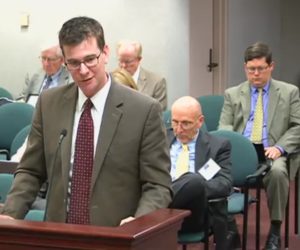Representatives of four high-profile charter school networks told a Florida House committee they are eyeing the state for future expansions. They also discussed the barriers that might keep them away.
When it comes to attracting top charter school operators, the Sunshine State has a lot going for it.
It's the third-largest state. Its population is growing — so much so that some districts are rolling out the welcome mat to charters that might help exert growth. Its 20-year-old charter school law is ninth-best in the nation, according to the National Alliance for Public Charter Schools. It has more than 650 charter schools and thriving school choice culture. But since charters enroll one in ten of its 2.8 million public school students, it isn't totally saturated.

Peter Bezanson, of BASIS charter schools, testifies before the Florida House Choice and Innovation Subcommittee.
And yet, the state has struggled to attract the kind operators that appeared before the House Choice and Innovation Subcommittee this week — organizations that draw national headlines for targeting the most disadvantaged students and pushing them toward college.
Each of the charter groups cited potential obstacles that, in one form or another, are on lawmakers' radar during the upcoming legislative session: Teacher certification rules, school facilities, equitable funding.
BASIS runs academically "hyper-accelerated" charter schools in Arizona, Texas and Washington. Its schools push ninth-graders to take precalculus and require their students to take at least six Advanced Placement exams. It's created elementary schools and extended school days to make its demanding academics accessible to low-income students.
CEO Peter Bezanson said Florida is one of the top four states where BASIS eyeing future growth.
"We wanted to be a great choice, a high-quality choice for every kid who is willing to work hard," he said.
BASIS schools like to hire "subject-expert teachers," Bezanson said. If teachers are well-trained in a subject like physics and have an ability to connect with students, he said, certification exams and other regulations become needlessly onerous. (more…)
NASHVILLE - This morning, at a national charter school gathering, Texas-based charter management organization IDEA Public Schools won the 2016 Broad Prize for Public Charter Schools.
The $250,000 award recognizes charter networks for strong academic results, especially among low-income children of color.
In a move that echoes past Broad winners, IDEA founder Tom Torkelson said the network plans to share the prize money with its fellow finalists — New York-based Success Academy and Houston-based Yes Prep.
Perhaps more noteworthy is how he envisions spending the money. It's earmarked for helping disadvantaged students prepare for college, but Torkelson said he specifically wanted to use it to help immigrant children — including those whose families are undocumented.
"They've made a choice, every day, to come to a high-quality public charter school," he said during his brief acceptance remarks at the National Charter Schools Conference. "All they want is the recognition and the respect of their fellow citizens."
Many of his words, which paid tribute to hard-working immigrants who strive in school and serve in the military, were drowned out by roaring applause that overwhelmed this reporter's feeble recording device.
Tax credit scholarships. A student receiving a scholarship overcomes homelessness and excels in high school. Miami Herald. The Tampa Tribune analyzes the program's growth.
 Charter schools. Charters account for one-third of Hillsborough's enrollment growth. Tampa Bay Times. Sarasota school officials criticize four charter applications. Sarasota Herald-Tribune. The Naples Daily News follows an in-depth series on charter schools with an editorial calling for changes.
Charter schools. Charters account for one-third of Hillsborough's enrollment growth. Tampa Bay Times. Sarasota school officials criticize four charter applications. Sarasota Herald-Tribune. The Naples Daily News follows an in-depth series on charter schools with an editorial calling for changes.
Broad Prize. Orange County Public Schools share in the national award for urban districts. Florida Today. Orlando Sentinel. Associated Press. Education Week. WESH. News 13.
School choice. With some schools overcrowded and others under capacity, Palm Beach schools may give parents more choices. Palm Beach Post.
Magnet schools. Plans for Pasco's first magnet school are taking shape. Gradebook.
Testing. A Gainesville teacher's testing revolt prompts a town-hall meeting at her school. Gainesville Sun. Parents discuss opting out. Florida Today. Testing is a part of life, and has improved results for students, incoming House Speaker Steve Crisafulli argues in a Florida Today op-ed.
Tax credit scholarships. Parents of children who receive scholarships answer critics in the Florida Times-Union and the Ocala Star-Banner. The program enhances public education, Doug Tuthill writes in the Miami Herald. He is the president of Step Up for Students, which co-hosts this blog. The president of the Alachua County League of Women Voters criticizes charters and vouchers in the Gainesville Sun. A school board member also criticizes tax credit scholarships in the Sun, focusing on religious education. State standardized testing requirements won't appease all critics, but they might help the program in the long run, Paul Cottle writes at Bridge to Tomorrow.
School choice. Private and charter schools compete with magnet and career education programs in Palm Beach County, fueling a drive to create new options. Palm Beach Post.
Charter schools. Hillsborough officials are scrutinizing the boards that oversee schools managed by Charter Schools USA as lawmakers debate charter legislation. Tampa Tribune. The management group Academica faces federal scrutiny. Miami Herald. The Volusia County school district prepares to end a long legal battle with a failed charter school. Daytona Beach News-Journal.
Dropout prevention. Pinellas schools plan a new alternative school aimed at at-risk students. Tampa Tribune.
Digital learning. Replacing old computers won't be cheap for Marion County schools. Ocala Star-Banner. Technology helps a Southwest Florida teacher enhance instruction. Naples Daily News.
Discipline. Kindergarten students face increased suspensions, which disproportionately affect minorities. Florida Times-Union.
Testing. A computer glitch affects FCAT administration in Miami-Dade schools. Miami Herald. A group of parents and teachers protests high-stakes testing. Fort Myers News-Press. Even at the height of FCAT season, educators say kids need a chance to get outside and play. Tampa Bay Times.
Tax credit scholarships. A bill that would expand access to the program is ready for a final vote in the House. News Service of Florida. Associated Press. Times/Herald. Palm Beach Post.
Broad prize. The award for urban school districts raises its standards, naming only two finalists for this year's prize. One of them is Orange County, Fla. Orlando Sentinel. EdWeek.
 Charter schools. A former teacher lodges a complaint about a Hillsborough charter school, alleging it does not use properly certified teachers. Tampa Bay Times.
Charter schools. A former teacher lodges a complaint about a Hillsborough charter school, alleging it does not use properly certified teachers. Tampa Bay Times.
School safety. Miami-Dade schools hope to tamp rumors that circulate among students with a new text-messaging system. Miami Herald.
Career academies. A Glades construction academy could become a reality thanks to a recent donation. Extra Credit.
Teacher quality. Duval schools prepare a new initiative to lure high-caliber teachers and administrators to high-need areas. Florida Times-Union.
Superintendents. Seminole County's Walt Griffin gets a contract extension. Orlando Sentinel.
Common Core. A survey shows public opinion on the standards is split. Sunshine State News.
School days. Hernando schools consider six-period days to save money and give kids more time in each class. Tampa Bay Times.
Economic development. Palm Beach County schools and other officials are promoting their school system in an effort to lure new businesses into the area. South Florida Sun-Sentinel.
Maintenance. A bell in front of a Manatee County elementary school gets a rare cleaning. Bradenton Herald.
Awards. A newspaper honors 45 high school seniors. Daytona Beach News-Journal. Gainesville students are named Achievement Scholars. Gainesville Sun.
Charter schools. Democratic lawmakers have filed several bills to reign in problems that arise when charter schools close, reports Gradebook. Miami-Dade County planners reject a charter school's proposal to grow on the site of a former private school, reports the Miami Herald.
Jeb Bush. Talks Florida-style ed reform in Texas. Dallas Morning News. Texas Tribune. Associated Press. Austin American Statesman. KUT.org.
School spending. Lawmakers should loosen the strings on impact fee money, writes the Ocala Star Banner.
More sequestration. WOKV.com. Gradebook.
Teacher evaluations. Seminole officials fear good teachers could lose their jobs under the new system, reports Orlando Sentinel. In southwest Florida, only four people sound off on the evals at a DOE meeting, reports the Naples Daily News.
Teacher pay. Seminole teachers ask for more. SchoolZone.
Broad Prize. A Broad Prize site-visit team suggests Orange County could soon be in the running. Orlando Sentinel. (more…)
The sprawling, 125,000-student school district in Duval County, Fla., has a reputation for being particularly cold territory for vouchers and charter schools. But last month, its new superintendent recommended the school board approve a dozen new charter schools and, in doing so, sounded this refrain: We have to compete.
In an interview with redefinED, Nikolai Vitti said the competition injected into public education through expanded choice will improve schools in Duval, which has struggled with low-income students more than other big districts in Florida. He said he “vehemently opposed” limiting options for low-income parents. He spoke admiringly of the mission and innovative practices of the KIPP charter schools.
“The reality is, the market – meaning the structure of choice – forces me to compete, even if I don’t want to. And if I don’t compete, parents will continue to leave the school district,” Vitti said. “And so my role as superintendent is to improve our product.”
But Vitti, who previously served as chief academic officer in the Broad-Prize-winning Miami-Dade district, also offered a number of caveats. State rules tilt the playing field towards charter schools, he said. And in his view, the debate over them has been driven by perceptions of quality, not data.
“There are charter schools that have a track record of success, and particular charter schools that have failed, and failed in multiple areas,” he said. “Let’s not have an ideological conversation. Let’s have one based on data where we look at individual charter schools, individual traditional public schools, and ask the question: Who’s successful? Who’s not? And what’s the best situation for parents based on how they’re looking at it, and how the district as informed educators are looking at it?”
Vitti also offered a surprising take on who should authorize charter schools. In Florida, only school boards can do so – a situation that charter school opponents prefer, and one that may be tough to change because of restrictive language in the state constitution. But Vitti said unless changes are made to the charter application process – something that forces better dialogue between charters and districts – he’d rather have the state do the authorizing.
“I do believe there’s a way to create a balance between simply approving charter schools at the district level based on a boilerplate application process … and instead allow and require the charter school to be more strategic with the district,” he said. But “if we’re not going to create some kind of balance between that, then simply place the onus of the application process on the state. Because essentially that’s what’s happening already.”
At the EdFly Blog today, former Orlando Sentinel columnist Mike Thomas asks a reasonable question: Why isn't the Florida teachers union trumpeting the dramatic gains of Florida teachers? This morning's Education Week ranking is just the latest in a long string of credible reports that finds Florida making steady academic progress. Shouldn't Florida teachers, doing more with less and under enormous pressure to produce results, get credit from those who portray themselves as their biggest supporters? Here's Thomas:
Florida scored another impressive victory with the state finishing sixth in the Education Week “Quality Counts’’ rankings.
This follows news from last month that Florida fourth graders finished second in the world on international reading assessments. In October, Miami-Dade won the prestigious Broad Prize for urban school districts because of progress in closing the achievement gap. Florida kids ranked second in the nation in learning gains dating back to the 1990s. I could go on.
Alas, Florida’s good news is not celebrated by all, even by its own teachers’ union. The Florida Education Association has been silent on all of the above, even though its teachers are on the front lines of these successes. Repentant reformer Diane Ravitch actually compared student achievement in Florida and Massachusetts. Of course Massachusetts kids perform better. Look at the student demographic and income data, Diane. Are you serious?
The reason for this denial is that Florida did not achieve its success by acceptable means. By that, I mean if the state had achieved these results by tripling education spending and eliminating its accountability provisions and school choice options, the above victories would have been trumpeted from the rooftops by the FEA and Diane as well.
Continue reading Thomas' post here.
Big payout to charter school principal. The principal of a failed charter school gets a $519,453 check from the school’s board, reports the Orlando Sentinel, prompting outrage from Orange County school district officials and a call for an investigation from state Sen. David Simmons: “There's no room for abuse by charter or traditional schools," Simmons, a strong supporter of school choice, told the paper. "All it does is hurt children."
Lax oversight of charter school funding. An audit finds the U.S. Department of Education did not properly monitor how states were spending hundreds of millions of federal dollars for charter schools, reports the Associated Press. The audit also looked at charter funding oversight in Florida, California and Arizona. In Florida, according to the story, “state officials had no records of which schools received federal grant money nor which schools received on-site monitoring and audits.”
Charters, IB and a level playing field. The charter school system in Lake Wales complains the Polk County school district isn’t playing fair in recruiting students to the district’s IB programs, reports The Ledger.
Tax credit scholarships helping private schools. Growth in Florida’s tax credit scholarship program is giving private schools a boost, reports the Daytona Beach News-Journal.
Teacher who likes Mitt Romney. StateImpact Florida interview here.
Lesson from Miami-Dade. In winning the Broad Prize, the Miami-Dade school district showed “poverty does not have to be an obstacle to success,” editorializes the Miami Herald.
Pick up the pace. Florida needs to put even more focus on education and accelerate improvement, editorializes the Fort Myers News Press.
A closer look. Pinellas Superintendent Mike Grego says the district’s state-directed teacher evaluation system, which has caused widespread frustration, needs a review, reports the Tampa Bay Times.
More Broad Prize coverage. As we noted yesterday, the Miami-Dade school district won this year’s Broad Prize, which goes to the urban district with the most academic progress. More from the Orlando Sentinel, Christian Science Monitor, Associated Press, Education Week. The Palm Beach school district was a finalist, which is also impressive. All this is more reason to routinely compare achievement data district by district in Florida. Also worth noting: Miami-Dade is a poster child for the new definition of public education, with a broad menu of learning options and huge numbers of parents embracing them.
Charter school issues in Volusia. The Volusia school board approves improvement plans for two F-rated charter schools, reports the Daytona Beach News Journal.
PTA doesn’t like it. The Florida PTA pans the Board of Education’s decision to set steeper improvement goals for low-income and minority students, reports the Gradebook blog.
More on Amendment 8. The Tampa Bay Times gets credit for going into detail about the legal case that’s at issue here – a case that has nothing to do with vouchers. ICYMI, our take on Amendment 8 here and here.
So the Democrat supports vouchers? In this state senate race in Central Florida, yes, notes the Orlando Sentinel.